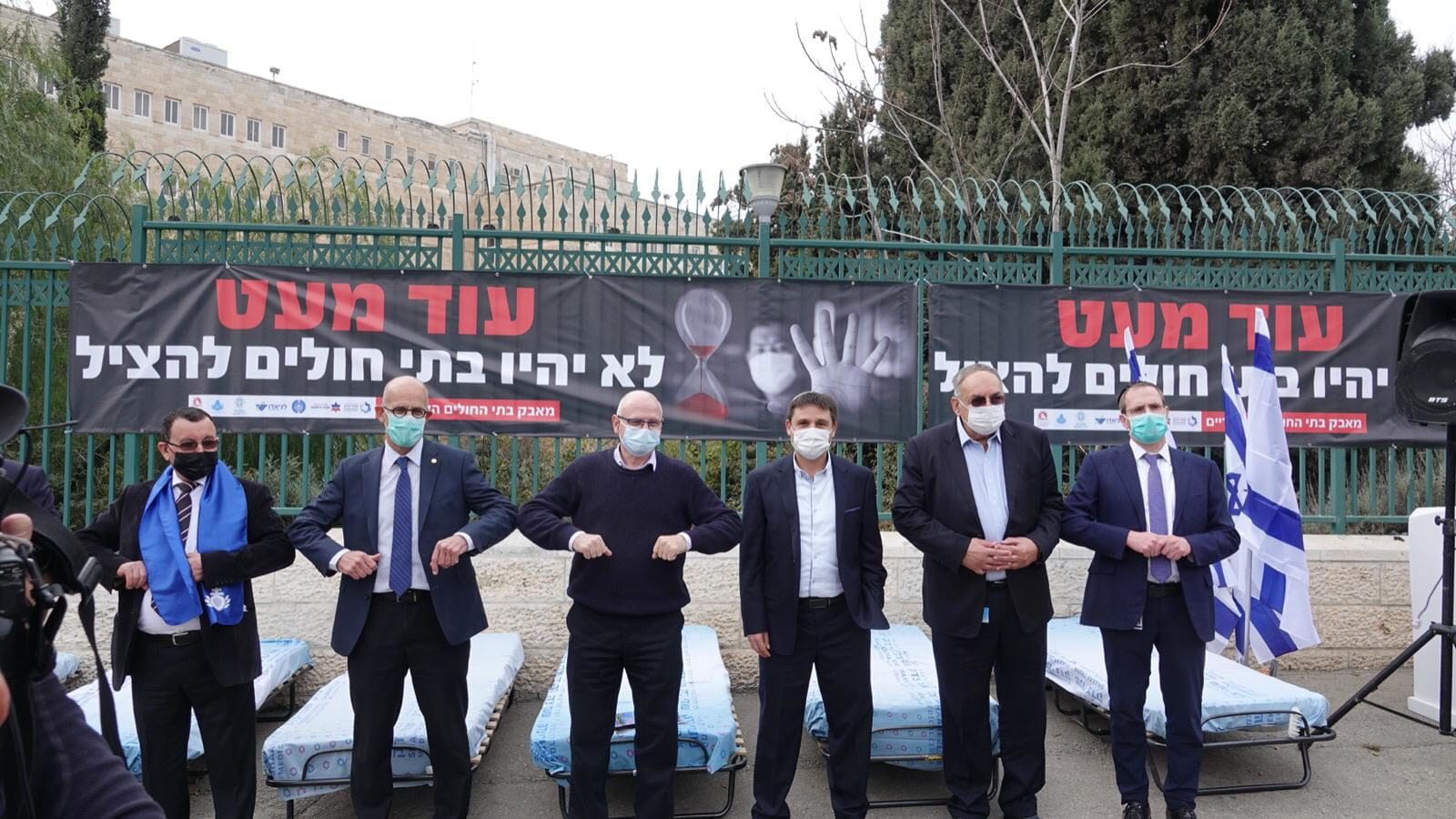 Hospital administrators stand before empty beds and a sign reading “Soon there will not be any hospitals to save,” at demonstration in Jerusalem, Israel, Jan. 13, 2021. (Courtesy)
Hospital administrators stand before empty beds and a sign reading “Soon there will not be any hospitals to save,” at demonstration in Jerusalem, Israel, Jan. 13, 2021. (Courtesy) The Media Line — Seven Israeli hospitals will close their doors to nonessential treatments in one week if the government does not find a way to forge a budgetary agreement that will enable them to operate.
Hadassah Medical Center and Shaare Zedek Medical Center in Jerusalem; Laniado Hospital in Netanya, the seaside city north of Tel Aviv; Mayanei Hayeshua Medical Center in Bnei Brak, just east of Tel Aviv; and, in the Galilee, Holy Family Hospital, Saint Vincent De Paul French Hospital and Nazareth Hospital EMMS, will all pare down their activities to only emergency and essential health care next week.
The seven nonprofit hospitals hold roughly 3,200 beds.
This stark move is in response to inequitable funding from the government as compared to other hospitals in the country.
“We are orphans of the system. We will not be able to pay our staff or our suppliers and contractors at the end of the month. This must stop,” Prof. Zeev Rotstein, director general of Hadassah Medical Organization, told the media gathered outside the Finance Ministry in Jerusalem on Wednesday.
Israel has 44 general hospitals.
Nineteen of these are owned and operated by the state (“government hospitals”) and treat close to 50% of all patients. Nine are owned by the four national health funds (think HMOs), with the largest being Clalit Health Services, which treats 30% of hospital patients.
These seven nonprofit private medical centers – those going to emergency operations next week – treat 20% of those hospitalized.
Finally, there are other privately owned hospitals, some of which are for-profit institutions.
According to a 2019 State Comptroller’s Report, Israeli hospitals suffered from a combined deficit of NIS 5.6 billion (about $1.8 billion). During the last year, the state covered NIS 3 billion for the government sector’s hospitals, whereas Clalit received NIS 2.3 billion to cover its hospitals, as well as other payments for its other operations. The seven nonprofit hospitals shared a NIS 200 million “stabilization payment.”
Because the state owns and runs its own hospitals, their deficits are cleared up first, whereas the other hospitals are left fighting for funding to stabilize their operations.
“There is a very clear, inherent conflict of interest in the Israeli health care system. The government regulates all of the hospitals and to some extent helps finance them. However, government hospitals are in direct competition with the nonprofit ones,” stated Prof. Avi Weiss of the Economics Department at Bar-Ilan University, near Tel Aviv.
“This differential treatment has been [the subject of] an ongoing discussion for the last 30 to 40 years already. Everyone talks about this inherent imbalance that leads to the government hospitals having their deficits covered by the government, while others are not,” Weiss, who is president of the Taub Center for Social Policy Studies in Israel, told The Media Line.
Weiss also noted that hospital treatments for most patients are funded through the health funds, another structural imbalance in the system.
Ibrahim Harbaji, medical director at Holy Family Hospital in Nazareth, bitterly complained that he has to work within the health fund payment system. “If a treatment costs NIS 1,000 and the health fund will only pay NIS 600 or NIS 700, we have to take what they give us, on their terms.”
“Yet, the system is absolutely underfunded,” he said.
Waseem Dibbini, chief financial officer and deputy CEO of the Nazareth Trust, which operates EMMS Nazareth Hospital, described the imbalance to The Media Line.
“The government hospitals that handle close to 50% of all patients received NIS 3 billion (which also covers pension payments) in payments from the government. We [the seven hospitals] treat 20% of the patients and expect to receive an equitable amount. We are entitled to receive a 20% share, at NIS 1.2 billion,” said Dibbini.
This linear, equitable division, he posited, is not occurring.
Though operating in the same economic and regulatory environment, there is no equality, Dibbini argued.
The coronavirus pandemic is exacerbating the situation. The seven nonprofit hospitals are handling 35% of all corona ward beds, creating even more difficult operating conditions for the institutions.
For instance, each corona patient entails extra expenses for the hospital compared to a patient in a general admissions bed. First, more staff members are required to treat a corona bed than a general bed. In addition, the hospital is required to add extra treatments and medicines plus enlarge its supply of ancillary – yet necessary – items for the staff such as personal protection equipment including gloves, masks and gowns.
This situation not only adds to the workload and shifts for burdened staff but also aggravates the payments imbalance.
“There is less revenue coming in from regular patients, because we accept more corona patients for which we also accrue more expenses for their treatment. This increases our already existing deficit even more,” said Dibbini.
The Finance Ministry said, in response to The Media Line’s questions: “In a meeting that took place today between the public hospitals, the deputy finance minister and his staff, Deputy Finance Minister Yitzhak Cohen reported that he hoped it would be possible to push forward the CAP law [the accounting mechanism between the health funds and the hospitals] that is expected to bring a significant improvement in the public hospitals’ budgets.
“As such, it was agreed that the Finance Ministry, together with the Health Ministry, will work to draft support criteria so as to quickly provide payments to the public hospitals. This, in order to enable them to receive immediate funding and to provide certainty in budgetary planning,” the ministry said.





















 More news and opinions than at a Shabbat dinner, right in your inbox.
More news and opinions than at a Shabbat dinner, right in your inbox.